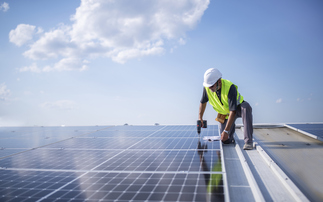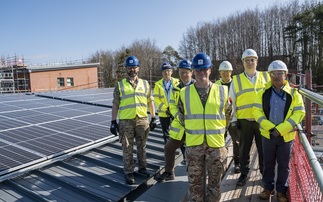Response to parliamentary question confirms only that planned changes to solar subsidies are "intended" to take effect from next April
Climate Change Minister Greg Barker has today responded to a written parliamentary question about the government's plans to review solar subsidies, confirming a consultation is in the pipeline, but providing little further information to reassure developers.
Green MP Caroline Lucas this week lodged a written parliamentary question calling on the Department of Energy and Climate Change (DECC) to confirm that it recently assessed public levels of support for solar farms and provide assurances that it will not impose changes on the level of subsidy available to solar farms until April 2015 at the earliest.
The intervention followed reports DECC is planning to undertake its third review of solar subsidies in as many years in a move designed to cut support for solar farms and potentially increase support for commercial-scale rooftop installations.
The proposed consultation has prompted an angry response from the solar industry, which has accused ministers of again undermining investor confidence in the sector by failing to clarify the scale of any cuts and the timetable for their introduction.
In a blog post published alongside her written question, Lucas said the review was "unjustified and harmful", adding that "ministers' claims that solar farms are blighting our countryside are wildly overstated".
Responding to the question today, Climate Change Minister Greg Barker acknowledged the recent DECC Public Attitudes Tracking survey showed "strong levels" of public support for solar power, with current support levels reaching 85 per cent.
But he noted that "these figures relate to support for solar PV in general, rather than any specific form of solar energy generation", adding that "the survey does not include any reference to large-scale or ground-based solar" projects, some of which have been known to face local opposition.
He also confirmed the government was undertaking a review of current solar subsidy levels and said the intention was to ensure any changes take effect from the next financial year, but he failed to provide any firm assurances on the precise timing or scale of any cuts.
"The government said in the UK Solar PV Strategy Part 2, published on 4 April 2014, that we are considering the implications of current trends of deployment in solar PV on the financial incentives available in Great Britain under the Renewables Obligation and small-scale Feed-in-Tariff," the written statement confirmed. "We will issue a public consultation shortly proposing changes to financial support for solar PV. The proposals on which we will be consulting are intended to take effect from the 2015-16 financial year."
Privately, government sources have insisted changes to the subsidy regime are required to prevent a surge in solar farm development eating through the government's clean energy budget. Moreover, ministers are understood to be concerned that excessive solar farm development could fuel local opposition to new projects.
Speculation is now mounting across the industry as to when the consultation will appear, how deep the anticipated cuts to solar farm subsidies will be, and whether they will be sufficiently offset by increased incentives for large scale rooftop installations.
Some industry sources had expected the consultation to be published last week, but it failed to materialise and there is now speculation that it will appear next week. Others have questioned whether purdah rules relating to this month's European election could delay the publication of the consultation further, but BusinessGreen understands it could be released ahead of election day.
Government sources refused to be drawn on when the consultation will be launched, but the apparent delay has fuelled talk across the industry of a disagreement within government over the precise detail of the proposed cuts.
Meanwhile, solar developers remain on tenterhooks over the potential impact of any changes on their project pipelines. Consequently, frustration is mounting across the sector, with industry insiders privately accusing ministers of attempting to stifle a technology that enjoys widespread public support and falling costs.
"If fracking enjoyed public support levels of 85 per cent, ministers would literally be falling over themselves to shout about it at every available opportunity," said one industry source. "DECC really has no evidence that solar farms are denting support for solar in general, with solar support at its joint highest level since the series began in summer 2012."
They added that the "ongoing lack of clarity" on the scope and scale of the imminent review was proving "particularly unhelpful" for developers and investors. "No other renewable energy technology is suddenly facing such a high level of uncertainty in less than 11 months time," they said. "We really thought that the government had moved on from this type of short-term policy making. We were wrong."









